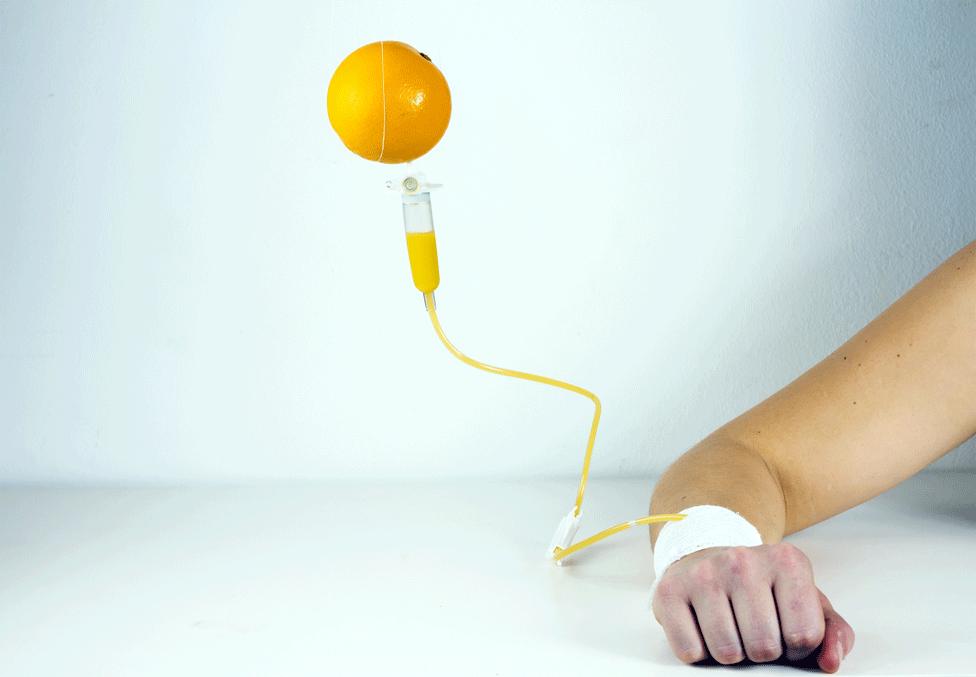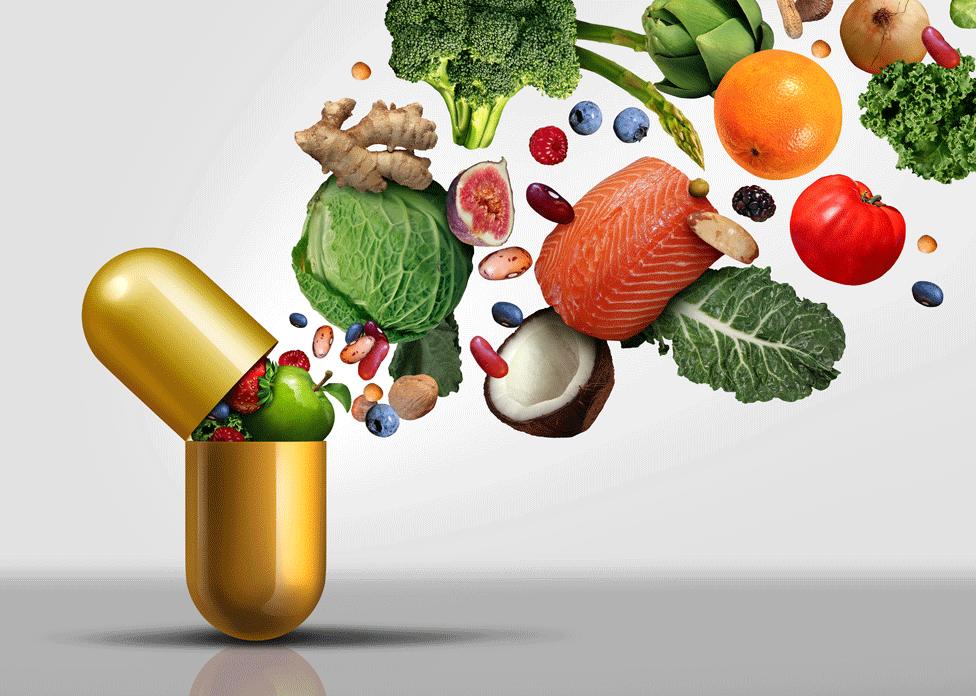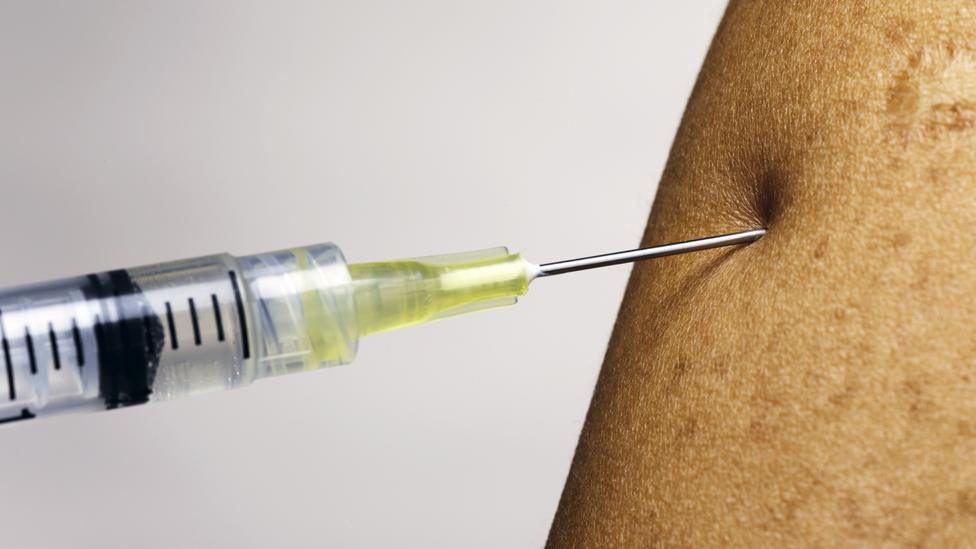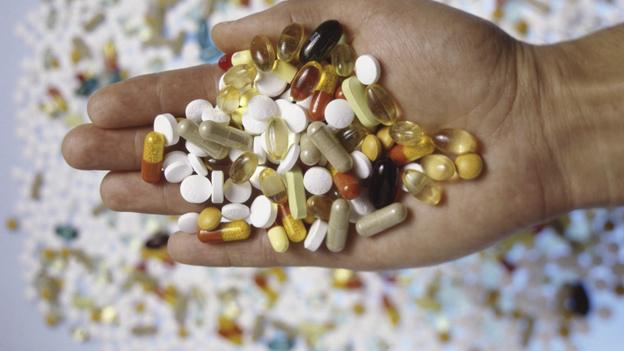Is it really worth injecting vitamins?
- Published

There is a growing trend for intravenous "vitamin" drips - but what are the risks? And do they even work?
Last month, a 51-year-old woman from Hunan, China, nearly died after blending 20 different fruits to create a homemade intravenous (IV) drip. She thought vitamins from the fresh fruit would benefit her health.
Instead, she developed a fever and itchiness, and was taken into intensive care with multiple organ damage. After dialysis, and several rounds of antibiotics, she is now recovering.
This is an extreme example, but she may have been inspired by the growing trend for IV in which vitamins and other substances are administered directly into the blood.
The practice is very popular in Asia where IV drips are offered in beauty salons, often by unlicensed and unqualified practitioners.
Those promoting vitamin IV drips claim they can boost energy, strengthen the immune system, improve skin, cure hangovers, burn fat, fight jet lag, and cure a myriad of other minor ailments.
In the US, a bus will even come to your house to offer infusions as part of a party package, to "cure" hangovers.
Treatments can be very expensive, costing anything from £120 to £3,000 in one London clinic.
Celebrities such as Miley Cyrus, Cara Delevingne and Chrissy Teigen have taken part in the growing trend, posting images of themselves on social media hooked up to IV bags.
Allow Instagram content?
This article contains content provided by Instagram. We ask for your permission before anything is loaded, as they may be using cookies and other technologies. You may want to read Meta’s Instagram cookie policy, external and privacy policy, external before accepting. To view this content choose ‘accept and continue’.
"The treatments are increasingly popular, particularly as a quick fix or hangover cure - but there is no evidence of benefits and they can potentially be dangerous," says Marcela Fiuza, from the British Dietetic Association.
"Within a medical setting, we would never infuse anything intravenously, unless we absolutely had to," says Sophie Medlin, who used to work as a clinical dietitian and as a lecturer in nutrition and dietetics at King's College London.
"There is simply no medical justification for administering nutrition intravenously in any case other than intestinal failure, because it is so high risk."
Typically, in a medical setting, a patient who has anything injected intravenously would have a thorough medical history taken.
Infusion of vitamins potentially puts the liver and kidneys under stress, and to go ahead without screening the liver and kidney function first is prohibited by the National Institute for Clinical Excellence (NICE) in the UK.
"That kind of provision is not being taken in most of the clinics I've seen practising intravenous vitamin drips," says Ms Medlin.

What is in the bag of fluid varies around the world. In Taipei, customers can receive a menu to choose what kind of vitamins they want to include.
In New Delhi, customers can pick between drips called "Basic" or "Thirsty" if for hydration, or treatments for skin called "Woke" or "Lit".
There is even a drip named "Magic Markle" after the Duchess of Sussex. In London, along with detox and beauty drips, one outlet offers mood boosts.
To boost their chances in university entrance exams, high school students in Hubei, China, were photographed hooking themselves up to intravenous vitamin drips., external
The image went viral, and the school claimed that the students had volunteered to take amino acids. As the school's infirmary became too full with the demand, the students took the IVs to the classroom where they could continue to study.
Ms Medlin is shocked by this - she says that IVs should never be administered outside a carefully-controlled clinical environment.
"Any time you put anything into your body intravenously, you're running the risk of infection from the site where it's entered your bloodstream," she says.
And why risk possible infection when our gut is excellent at absorbing the vitamins and minerals we need?
For most people, a healthy balanced diet (and in some cases an oral vitamin supplement) is sufficient to provide all vitamins you need, says Ms Fuiza.
Using IV drips mean that "people could be unknowingly receiving excessive amounts of nutrients which may have health implications, particularly for those having it regularly and people with background health conditions (known or unknown)", she warns.

Who needs vitamin supplements?
Certain groups at risk of deficiencies should use supplements:
All pregnant and breastfeeding women should take vitamin D supplements
Women trying to conceive and women in the first 12 weeks of their pregnancy are recommended to take folic acid supplements, which reduce their child's risk of neural tube defects such as spina bifida
People aged 65 and over should take vitamin D supplements
People with darker skin and people who are not exposed to much sun should take vitamin D supplements
All children aged six months to five years should be given a supplement containing vitamins A, C and D
Your doctor may also recommend supplements if you need them for a medical condition
If you fall outside these groups and buy vitamin pills then the chances are that you will be spending your money on surplus amounts of vitamins you have already gained through your diet

Lisa Rogers, from the World Health Organization, thinks that people are being overzealous in their ingestion of extra vitamins.
"They think that it will give them a certain advantage. People only need vitamins in tiny amounts and only in the case of having a deficiency is it worth considering taking extra supplements," she says.
Force-feeding vitamins into the veins via a drip could even put people at risk of a potential overdose, warns Ms Medlin.
"IV drips push vitamins into our bloodstream in a force-fed way. We will probably just excrete at least 90% of what's being infused in, so actually the benefits are very minimal, if any at all, and the risks massively outweigh the benefits," she says.
Even if no complications arise from injecting the vitamin drips, Ms Medlin says that ultimately, "You are just making very expensive urine. It is literally money down the toilet."
Listen to The Inquiry: How did we get hooked on vitamins? from BBC World Service on BBC Sounds.
- Published17 December 2015

- Published17 October 2013
